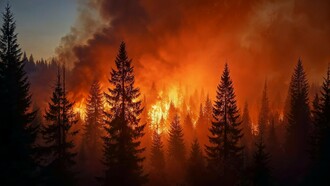The Taurus Full Moon is traditionally known as the Beaver Moon in northern climes, as these largely nocturnal, furry critters become particularly active at this time of year, building their winter dams in preparation for the cold months ahead.
Beavers are making something of a comeback in several areas of northern Europe. They were hunted into extinction in the UK before being reintroduced as part of the recent rewilding movement, keen to promote the benefits of wildlife and biodiversity naturally shaping our landscapes, particularly our waterways. The beaver lobby hasn’t had it all their own way, and there have been objections in some quarters, but where they have been reintroduced, they seem to be thriving, providing a genuine thrill for wildlife enthusiasts across the country.
Our Beaver Moon follows somewhat serendipitously from my article last month, “Hunter’s Moon: reconnecting with the natural world,” which addressed at length the climatic issues currently affecting the global hydrological cycle. It detailed evidence that as the planet’s temperature has risen, mostly due to human behaviour, the hydrological cycle retains more moisture from evaporation. There is less water on the planet’s surface, causing drought, and more water in the atmosphere, causing devastating downpours and flooding. It’s a vicious cycle of meteorological extremes. The threat was tragically illustrated by the flooding in Valencia, Spain, at the end of last month with the loss of over 200 lives. This is not an underdeveloped region of the globe lacking infrastructure and emergency services. The area is a paragon of modernity and a tourist destination for millions each year, yet seemed powerless to prevent the unfolding catastrophe. Despite warnings of the immediate potential for disaster, the scale of the torrential storms exceeded all expectations with horrifying, traumatic consequences. Meteorologists warn that as the planet continues to warm, there is only more of the same to come... and worse.
And the worrying statistical evidence keeps rolling in. 2024 is set to smash all records as the hottest year since recording began. This year we have already exceeded the 1.5ºC above pre-industrial levels threshold set by the Paris Agreement at the UN Climate Change Conference (COP21) in 2015. This legally binding international treaty on climate change was signed by 196 parties (pretty much every country on the planet) and sought to limit global warming to that temperature rise in the hope of avoiding increasingly severe climate change impacts, among them more frequent droughts, heatwaves, cyclones, hurricanes, and heavy rainfall.
COP 29 has convened this week in Baku, Azerbaijan, a human rights abusing petrostate in which gas and oil account for 90% of its exports. There is naturally some scepticism as to whether it has a genuine appetite to take climate action—in fact, it has already published plans to expand fossil fuel production incompatible with the 2015 Paris Agreement. Azerbaijani critics and journalists questioning the country’s fossil fuel production have regularly found themselves arrested and imprisoned, while Activist Greta Thunberg has warned of the prospect of another exercise in international greenwashing under the COP banner. Nonetheless, in his opening address to the conference, the summit’s president, Mukhtar Babayev, referenced catastrophes in Valencia and elsewhere to illustrate that climate breakdown is already a reality. “We are on a road to ruin,” the former oil executive announced. “People are suffering in the shadows; they are dying in the dark.”
The climate crisis is just as much about protecting human rights as it is about protecting the climate and biodiversity. We cannot pick and choose whose human rights to care for, and who to leave behind. Climate justice means justice, safety and freedom for everyone.
(Greta Thunberg)
Meanwhile, across the rapidly warming Atlantic Ocean, the American electorate has plumped for Donald Trump as their 47th President. The vote wasn’t as close as predicted, with Trump polling ahead of his opponent Harris at every turn. Trump, a renowned climate denier campaigning under the provocative slogan “drill, baby, drill," has plunged many environmentalists into a spiral of hopelessness as US fossil fuel extraction is set to hit new heights. (It should be added that extraction in the USA currently sits at an all-time high under the outgoing Biden administration.
Trump may be in gross denial regarding the causes of the recent hurricanes that devastated Mexico and Florida, but as he views the margins of his most recent victory through his tangerine-tinted spectacles, I’m controversially left wondering whether there isn’t some merit in denial as a focused philosophy.
Denial ain’t just a river in Egypt.
(Mark Twain)
Bear with me; it deserves examination. Modern living in rich nations presents us with countless options. Employment, education, leisure choices; whether we raise a family; sexuality and gender are more fluid than ever; the immediacy and breadth of consumer choice, all augmented by the barrage of opinion/information available through nanotechnology. As a consequence, our attention span has been shattered. The ability to concentrate specifically on one sphere of intent (such as fundamental survival) has been lost to many of us. With fragmented awareness, we leave ourselves open to any influence that is shiny enough or shouts loud enough to engage our fleeting fancy. There are so many potential goodies pedalled as a panacea to our general malaise of dissatisfaction that most of us remain preoccupied with an overbearing FoMO. What do we ignore? What do we give up? How much more is enough?
As a teacher of mindfulness in schools, I am often surprised by how quickly I can encourage an unruly group of teenagers into a state of quiet concentration by inviting them to focus solely on their breath. Within a very short period of time, once the inevitable giggles have died down, students generally unearth an ability to place their undivided attention on something as simple and natural as the air moving in and out of their lungs. They naturally encounter distracting thoughts but are encouraged not to worry about these by simply acknowledging the thoughts and returning their attention immediately back to the breath.
As I constantly maintain in the sessions, it’s not rocket science. In making a specific choice to focus entirely on the breath to the exclusion of everything else for even just a few minutes, we persuade our often distracted mind to calm, settle, and eventually, with a bit of practice, empty. The scientifically proven benefits of improved concentration, reduced anxiety, and better quality of sleep are well documented, but in effect, practicing mindfulness asks my students to cultivate an attitude of denial. In focusing solely on their breath, other distractions can be allowed to come and go without disturbing their quiet state of focused intent. “Just imagine,’ I regularly say to the kids, ”being able to place your full attention exactly where you want it to be, whenever you want, whatever the circumstances. Might not the advantages in school and elsewhere be enormous?” (I include a step-by-step guide to the simple mindfulness technique at the end of this article.)
We don’t have to look far to find some pretty heavy, depressing stuff going on around us, and it can be debilitating to witness even if it’s not happening directly to us. News outlets and social media thrive on bringing us tales of misery. Trump knows this. He knows that a vile antagonistic tweet will do more to raise his profile on algorithm-led platforms than loving comments about his mom. The bigger the news story of disaster, the greater the number of newsroom hits, which immediately translates into the golden goose of advertising revenue. Bad news is good news for business. Tragedy is a bonus.
I’m no supporter of Donald Trump, but in his single-minded focus of intent and his denial of everything other than his clear objective, he has created a model for his own success. One could argue that it’s at the expense of many others, but a majority of voters in the US currently don’t think so.
So what does the Trump model of denial offer us? For me, it opens up a more conscious choice surrounding the focus of my thoughts and experiences. Why would I choose to focus my attention on distracting social media posts or news reports if their sole return is a negativity that bleeds into my day-to-day experience? Why choose to engage with unrelated gossip and heresay if I’m merely being ‘entertained’ by another’s misfortune? Why show more interest in other people’s negative stuff when there are so many unique, positive experiences of my own design to explore?
It might equally be argued that we don’t have to look far to find some pretty awesome, inspiring, and uplifting experiences going on that we would be foolish to overlook because of a culturally conditioned, default preference for crap. Those of us in a privileged enough position to exercise positive choice might even be doing the world a favour. In creating a positive personal outlook and awareness, not dwelling on the inevitable shit that happens, we contribute in a very tangible, advantageous way to the interconnected collective consciousness of planet and inhabitants. In denial of anything that does not reflect the peaceful, caring coexistence most of us claim we want to see, we develop a clearer aspirational vision of life on this beautiful planet toward which we can work for the benefit of All.
This is not to suggest that we will never be heartbroken by circumstances or other people’s choices, as many in Spain and the US must be feeling this week, but amidst the despair we can galvanise ourselves to turn up with a consistently positive, caring attitude that counters the current plague of populist-driven manospheres, brimming with belligerent, misogynist, and racist authoritarianism.
You are angry the children are being bombed or the forest is being cleared because you care about them, so it’s not the feelings about the forces of destruction that is primary. It’s the love, and not losing sight of that is crucial.
(Rebecca Solnit)
Denial in this context does not suggest that we merely want an escapist's route to a happy-clappy, sunshine-and-smiles existence. It can be a considered statement, an actioned manifesto, refuting through acts of kindness that the divisive learnt traits of cruelty, manipulation, enmity, envy, and greed will ever trump the transcendental qualities of our inherent nature: that of truth, unity, beauty, and goodness.
Denial helps us to pace our feelings of grief. There is a grace in denial. It is nature’s way of letting in only as much as we can handle.
(Elizabeth Kubler-Ross)
A simple guide to mindfulness practice
Recommended as you first rise in the morning, just before you retire to bed in the evening, during coffee or toilet breaks, or just when you feel like it.
Switch off the devices—no distractions. If necessary, let others in your household know that you do not wish to be disturbed for a short while. Create a quiet, relaxed space with a chair on which you can sit comfortably with a straight back. Wrap yourself in a blanket if it feels right.
Close your eyes, sit with a straight back, and concentrate solely on your breathing until your thoughts start to slow down. Don't beat yourself up if uncontrolled thoughts keep distracting you—just acknowledge those thoughts, then swiftly return your concentration to the breath—quite literally the physical sensations of breathing in and out and only this.
When the mind finally calms (5-10 mins), i.e., when the gaps between thoughts get noticeably longer, a spaciousness may be experienced. Relax and dwell in that spaciousness as long as it feels comfortable, returning concentration to the breath when thought intermittently arises.
To finish, gratefully acknowledge that spaciousness as your own: a safe, happy, healthy, and, above all, peaceful space to which you can return at any time simply by focusing on your breath.
Return to the awareness of your body, surroundings, and your day-to-day activities, hopefully imbued with calm. You will have engaged with "a love of already satisfied desire." (Albert Einstein) It's better than telly.















